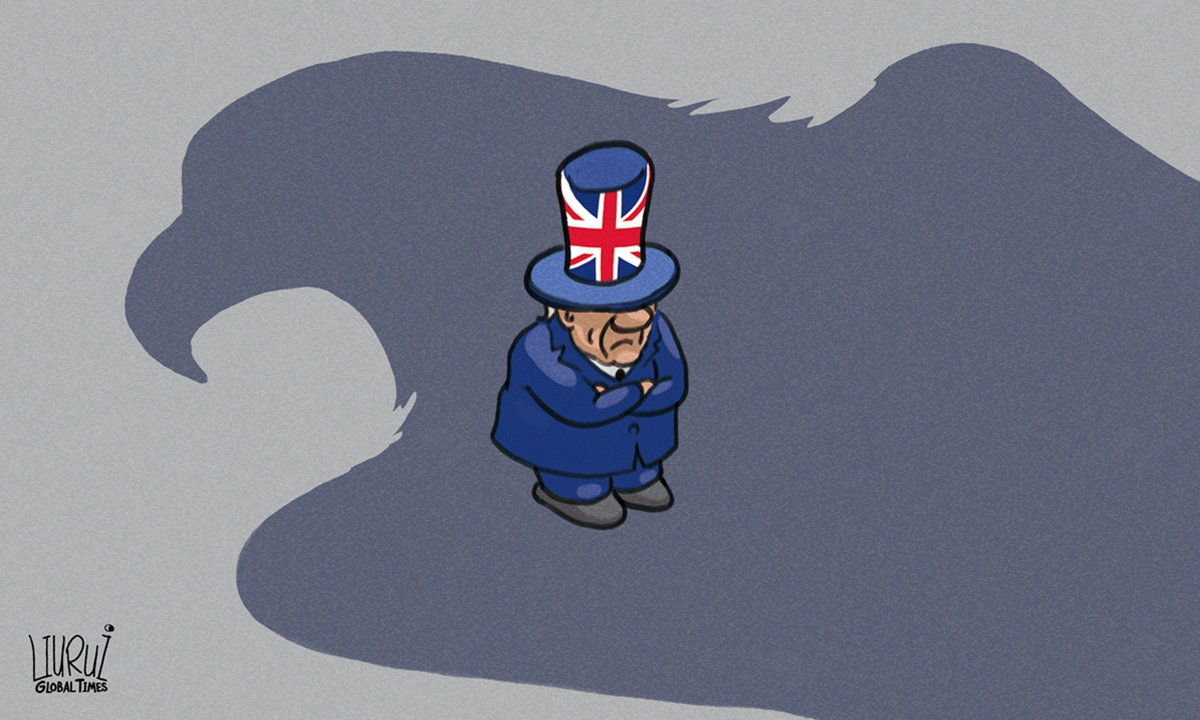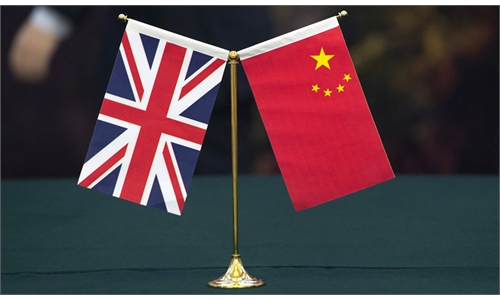
UK US relations Illustration: Liu Rui/GT
The British economy is in a bad situation. Hammered by stagnant growth, surging inflation and high interest rates, the UK arguably looks to be in a more pessimistic situation than any other country in G7. The problems are long set and structural, but also a product of foolish foreign policy decisions the country has taken in recent years that have been exclusively guided by ideology and nostalgia for an imperial past. While Brexit is one problem, the decision to reset its relationship with China and buy into the American agenda is another. Although the UK lauds its recent joining of the CPTPP (Comprehensive and Progressive Agreement for Trans-Pacific Partnership) trade agreement as a success of its so-called "Indo-Pacific tilt" this is in practical terms, meaningless. That's because Britain has shunned the markets which matter to it the most, China and the EU.The Conservative-right linked Telegraph has become one of the leading advocates of anti-China paranoia in the UK, which is fed into by Sinophobic MPs on the political right of the party who are keen at all costs to disrupt the government from pursuing a more pragmatic relationship with Beijing. Liz Truss and Iain Duncan Smith are the most prominent. Now, dissenting voices are stirring up trouble again regarding the manufacturing and import of Chinese electric cars into the United Kingdom, claiming baselessly that these cars will be used to gather data and "spy" on British citizens. Such allegations of espionage have often been associated with strategic Chinese technologies which the US desires to have restricted or banned, such as Huawei. It is based on pure McCarthyite paranoia and cynical opportunism, than any empirical evidence.
As it were with Huawei, which crippled the UK's 5G rollout and significantly raised the costs, an attack on Chinese electric cars will be devastating to Britain's goals to be carbon neutral. First of all, China is the largest manufacturer and exporter of electric vehicles in the world. In 2022, China exported over 1.3 million electric vehicles, and the number continues to surge. Secondly, as a consequence of this, Chinese electric vehicles are also cheaper and in greater supply than any other brands. As noted in an S&P study, the price of a Chinese manufactured electric car is around £10,000 cheaper than a one made by German automobile giant Volkswagen. In a country with surging inflation and costs of living, this matters.
In addition to this, the British government has for the past few decades pursued a series of economic policies whereby it has left the automobile market open and unregulated, which has resulted in the gutting of its own domestic vehicle manufacturing industry (bar several luxury brands) leaving the government with no control or coordination over its own market to either implement its own brands as strategy. Even the most iconic British car brand of all, the Mini, is now owned by a German company.
As a consequence, forcing Chinese made electric vehicles out of the country would significantly narrow the electric vehicle market which would place demand far above supply, and subsequently lead the prices of competing brands to surge, as there is not enough local manufacturing to supplement it. As it is, because of Britain's misguided decisions pertaining to the EU and the war in Russia, inflation of every day commodities, including food, has been astronomical. Despite this, the country has committed itself to very tight climate related goals and has vowed to ban new conventional petrol and diesel cars from sale by the end of 2030. This means that the market is playing catch up. Therefore, why would you even consider banning your largest source of electric vehicles?
But this is, of course, where Britain is at today, the UK needs China as a critical partner in many areas, but the proliferation of Cold War mindsets, being created and encouraged by the United States, and pushed by British MPs and the press, is undermining the country's national interests. The motto of Brexit was supposed to be "Global Britain" the idea of the UK finding new and alternative markets in order to offset a perceived violation of sovereignty on behalf of the European project. But that has not happened. Instead, the UK has become more beholden to Washington than ever and pursued a project of ideological and military Imperialism.
In conclusion, whipping up hysteria and imposing restrictions on Chinese electric vehicles would be an act of economic suicide on behalf of the British government. It would also only benefit the United States at the public's expense. Downing Street must exert more control over its foreign policy to ensure the country's own strategic autonomy in the pursuit of its national interests, rather than allowing ideological fantasists to run riot with rampant paranoia.
The author is a political and historical relations analyst. opinion@globaltimes.com.cn


